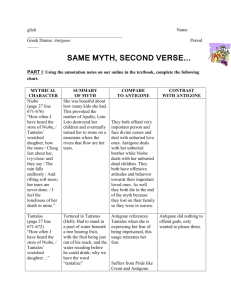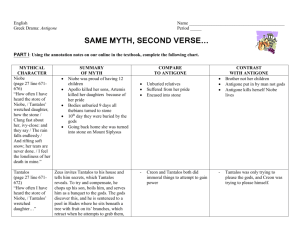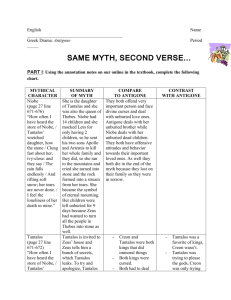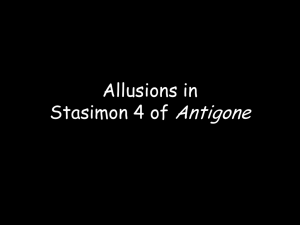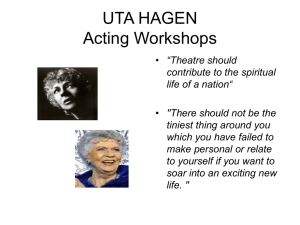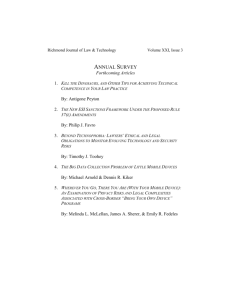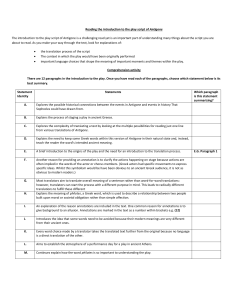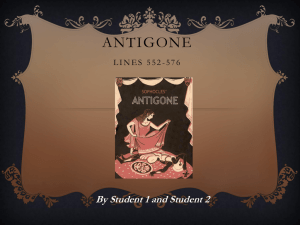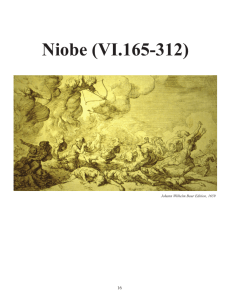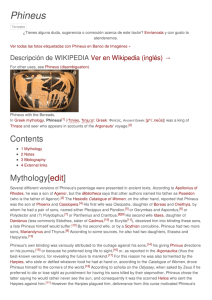2nd-Myth-Notes
advertisement
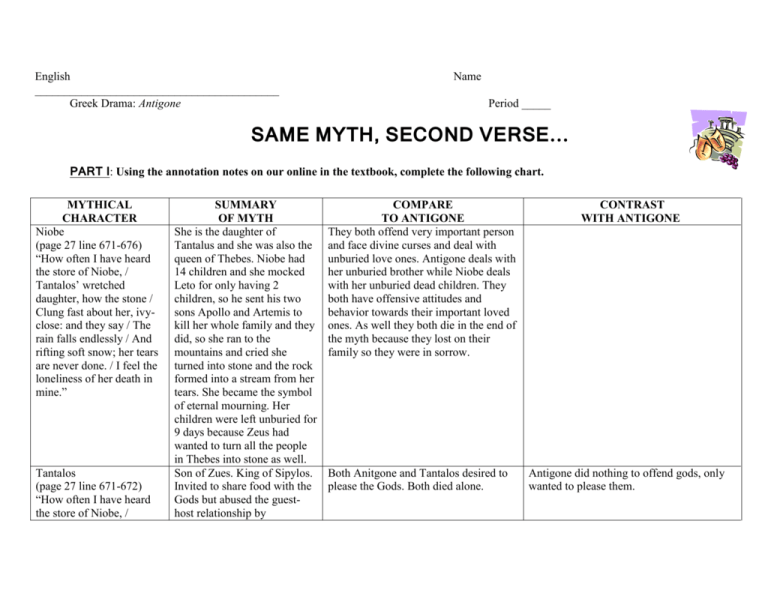
English __________________________________________ Greek Drama: Antigone Name Period _____ SAME MYTH, SECOND VERSE… PART I: Using the annotation notes on our online in the textbook, complete the following chart. MYTHICAL CHARACTER Niobe (page 27 line 671-676) “How often I have heard the store of Niobe, / Tantalos’ wretched daughter, how the stone / Clung fast about her, ivyclose: and they say / The rain falls endlessly / And rifting soft snow; her tears are never done. / I feel the loneliness of her death in mine.” Tantalos (page 27 line 671-672) “How often I have heard the store of Niobe, / SUMMARY OF MYTH She is the daughter of Tantalus and she was also the queen of Thebes. Niobe had 14 children and she mocked Leto for only having 2 children, so he sent his two sons Apollo and Artemis to kill her whole family and they did, so she ran to the mountains and cried she turned into stone and the rock formed into a stream from her tears. She became the symbol of eternal mourning. Her children were left unburied for 9 days because Zeus had wanted to turn all the people in Thebes into stone as well. Son of Zues. King of Sipylos. Invited to share food with the Gods but abused the guesthost relationship by COMPARE TO ANTIGONE They both offend very important person and face divine curses and deal with unburied love ones. Antigone deals with her unburied brother while Niobe deals with her unburied dead children. They both have offensive attitudes and behavior towards their important loved ones. As well they both die in the end of the myth because they lost on their family so they were in sorrow. Both Anitgone and Tantalos desired to please the Gods. Both died alone. CONTRAST WITH ANTIGONE Antigone did nothing to offend gods, only wanted to please them. Tantalos’ wretched daughter…” attempting to share the divine ambrosia with other mortals. He then invited them to a banquet where he served the Gods his dismembered son. When the Gods realized what he did, they restored his son Pelops back to life. He was punished by being tantalized in Tartarus. Danae She was the Princess of (page 29 line 738) Argos. A prophecy was made “All Danae’s beauty was that Danae’s son would kill locked away / In a brazen her father and take his throne cell where the sunlight in Argos, so her father could not come: / A small imprisoned her, but Zeus room, still as any grave, impregnated her anyway, so enclosed her.” her father locked her and her child in a chest and threw them into the sea but the gods delivered them safely, and her and her son Perseus defeated her father, and Perseus took the throne. Dyras’ son Lycurgos *Be sure to look at the nine (page 29 line 747) Implacable Sisters mentioned And Dryas’ son 8 also, that in that antistrophe! furious king, Bore the Lycurgus, King of Thrace, god’s prisoning anger for banned Dionysus and his cult his pride: Sealed up by from entering his lands. When Dionysos in deaf stone, Lycurgus learned that His madness died among Dionysus was in Thrace, echoes. educating people in the ways Both Danae and Antigone were imprisoned by the king of their kingdom. Both women were also influenced by the Gods in the choices that they made. Danae was locked up for a prophecy she could not control, where Antigone was imprisoned for breaking the law to bury her brother. Lycurgus, according to Sophocles, was locked in a prison of stone by Dionysus as punishment, similar to Creon sentencing Antigone to death in a cave. Lycurgus defied the gods, banning Dionysus and his followers from his land. Antigone, on the other hand, revered the gods and believe it was their will to give Polynieces a proper burial. of wine, he attacked Dionysus and imprisoned his followers. Dionysus cursed him to a life of madness, causing him to kill his wife and son. The nine Implacable Sisters are the Muses. Eidothea (page 30 line 759) “How a king’s new woman, sick / With hatred for the queen he had imprisoned, / Ripped out his two son’s eyes with her bloody hands” *Look at her father, god of the North Wind, as well as the Fates. Why would Ares grin at this while this shuttle plunged four times, four blind wounds crying for revenge? What’s with this shuttle and these wounds??? Goes against greater rule like Antigone by revealing they need to give sacrifices to Zeus More violent than Antigone Both were locked away in a cave and had family members who were blinded. Cleopatra was released from her prison alive. Ares grins because he likes fighting—four wounds because four eyes were stabbed. Daughter of the shape-shifting god Proteus, an early sea god. Cleopatra (page 30 line 760) “With hatred for the queen he had imprisoned,” Daughter of Boreus, the North Wind. First wife of King Phineus. Phineus locked her awy in a cave. Phineus’s second wife, Eidothea, acussed her two sons of attempted rape and tricked Phineus into blinding them. Cleopatra’s brothers, Calais and Zetes, freed her, put her sons on Phineus’s throne and set Eidothea away to her own land. PART II: What do all of these characters have in common? Part III: Look up these are allusions and provide a brief summary. Then write down the connection you see between this reference and Antigone. Mythical Character Persephone (line 716) O tomb, vaulted bride-bed in eternal rock, Soon I shall be with my own again / Where Persephone welcome the thin ghost underground: Acheron (lines 664) Now sleepy Death / Summons me down to Acheron, that cold shore: / There is no bridesong there, nor any music. Summary of Myth Connection to our play: Why reference this? How is it significant? Think of context and culture! She is the queen of the underworld, Her myth is a symbol of living and wife of Haides. Cursed to stay in dying. She, Antigone, is rewarded the underworld; because, she ate a for her sacrifice as she feels she pomegranate. has been wronged as Persephone; and thus she welcomes death to be with her. One of the rivers of the underworld ruled by Hades where souls are ferried across. Known as river of woe. Antigone accepts her death. Alludes to her death. Hephaistos I began the rites of burnt-offering at the altar, / But Hephaistos failed me: instead of bright flame, / There was only the sputtering slime of the fat thigh-flesh / Melting: Iacchos (page 35) O Iacchos son of Kadmeian Semele O born of the Thunder! Guardian of the West Regent of Eleusis’ plain O Prince of maenad Thebes and the Dragon Field by rippling Ismenos. . . the nymphs of Iacchos dance at the spring of Castalia. . . oh come from Parnasos: God of blacksmiths and fire He failed to start the fire for the alter, a bad sign. Allusion to war and conflict. *Be sure to include Semele, the Eleusis’ plain, maenad Thebes, the Dragon Field, Ismenos, Castalia, and Parnasos. Kudos if you can explain Dionysus is distantly related to Antigone’s family. Many places in Thebes have sacred connections to him. The tragedies were performed in honor of him. Amphion (line 901-902) Men of the line of Kadmos you who live Near Amphion’s citadel: Pallas (line 928) As I was unlocking the gate of Pallas’ shrine, For I needed her help today What is his citadel? Built wall around Thebes. Story is set in Thebes Athena, often given the epithet “Pallas”, is the Greek goddess of wisdom, courage, inspiration, civilization, law and justice, strategic war, mathematics, strengths, strategy, the arts, crafts, and skill in ancient Greek religion and mythology. *Why would Eurydice need her help? Eurydice’s name means “wide justice” and she seeks help from Pallas, another name for the goddess Athena, who is goddess of justice and wisdom which is the guidance Eurydice is seeking. why his female followers chant “Evohe evohe.’ Also called Bacchus(Dionysus). Son of Zeus and Semele, demigod. Ismenos, river god, son of Amphion and Niobe. Castalia, nymph at Mount Parsanos where the Oracle of Delphi is. Evohe is a cry of joy in nature Hecate and Pluto (line 940) To the outer plain where Polyneices was lying, No friend to pity him, his body shredded by dogs. We made our prayers in that place to Hecate And Pluto, that they would be merciful. Io Fire (page 35 lines 896) Io Fire! Chorister of the throbbing stars! O purest among the voices of the night! Thou son of God, blaze for us! The Furies (lines 848 page 33) And the Furies and the dark gods of Hell Are swift with terrible punishment for you. Deities of the underworld Creon was trying to appease the gods because he angered them with his pride Why reference Io Fire? Three sisters Alecto (the angry), Megaera (the grudging), and Tisiphone (the avenger) were created from the blood of Uranus when his son Cronus castrated him to take revenge on the loss of his siblings. They persecute crimes such as disrespect, injustice, perjury, or arrogance, and Creon was afraid of them.

